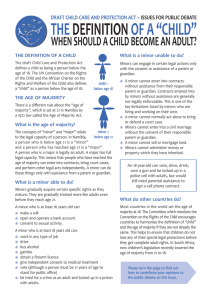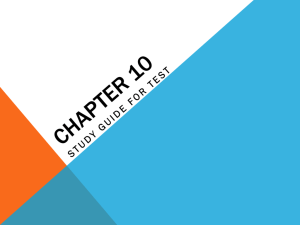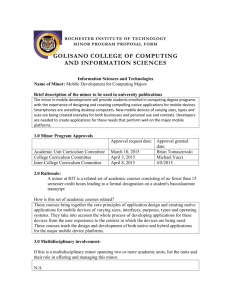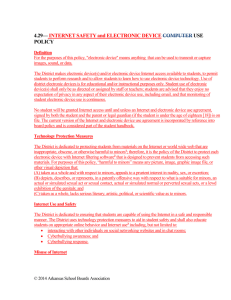suggested guidelines - Ball State University
advertisement
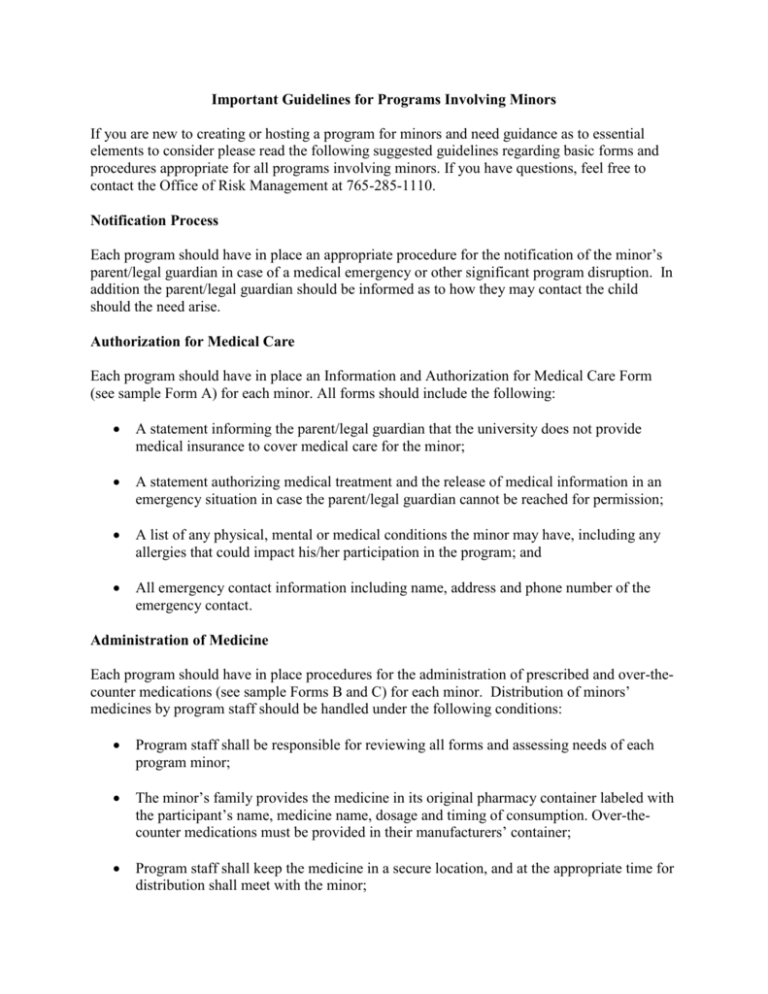
Important Guidelines for Programs Involving Minors If you are new to creating or hosting a program for minors and need guidance as to essential elements to consider please read the following suggested guidelines regarding basic forms and procedures appropriate for all programs involving minors. If you have questions, feel free to contact the Office of Risk Management at 765-285-1110. Notification Process Each program should have in place an appropriate procedure for the notification of the minor’s parent/legal guardian in case of a medical emergency or other significant program disruption. In addition the parent/legal guardian should be informed as to how they may contact the child should the need arise. Authorization for Medical Care Each program should have in place an Information and Authorization for Medical Care Form (see sample Form A) for each minor. All forms should include the following: A statement informing the parent/legal guardian that the university does not provide medical insurance to cover medical care for the minor; A statement authorizing medical treatment and the release of medical information in an emergency situation in case the parent/legal guardian cannot be reached for permission; A list of any physical, mental or medical conditions the minor may have, including any allergies that could impact his/her participation in the program; and All emergency contact information including name, address and phone number of the emergency contact. Administration of Medicine Each program should have in place procedures for the administration of prescribed and over-thecounter medications (see sample Forms B and C) for each minor. Distribution of minors’ medicines by program staff should be handled under the following conditions: Program staff shall be responsible for reviewing all forms and assessing needs of each program minor; The minor’s family provides the medicine in its original pharmacy container labeled with the participant’s name, medicine name, dosage and timing of consumption. Over-thecounter medications must be provided in their manufacturers’ container; Program staff shall keep the medicine in a secure location, and at the appropriate time for distribution shall meet with the minor; The program staff member shall allow the participant to self-administer the appropriate dose as shown on the container; Parent(s) and/or guardian(s) are expected to make arrangements for the administration of any medicine that the participant cannot self-administer; Devices for the self-administration of medications which are prescribed by a physician may be carried by the minor during program activities such as “epi” pens and asthma inhalers; and Over-the-counter medications can only be administered with prior approval. Program staff should make reasonable efforts to have basic first-aid kits available if needed. Minors can self-administer over-the-counter medication that they bring themselves. Supervision of Minors Program staff should make every effort to ensure all activities involving minors are supervised by at least two adults. Residential Camps In accordance with the American Camp Association, the ratio of program staff to program participants should reflect the gender distribution of the participants, and should, at a minimum, meet the following standards for resident camps: One staff member for every five campers ages 4 and 5 One staff member for every six campers ages 6 to 8 One staff member for every eight campers ages 9 to 14 One staff member for every 10 campers ages 15 to 17 Standards for day camps are: One staff member for every six campers ages 4 and 5 One staff member for every eight campers ages 6 to 8 One staff member for every ten campers ages 9 to 14 One staff member for every twelve campers ages 15 to 17 Use of University Facilities All supervised minors while on university property may use the general facilities of the campus such as athletic fields, public spaces, academic buildings, but may, as needed, be restricted from certain areas of the campus such as storage rooms, equipment rooms, athletic training rooms, employee offices and from utilizing certain equipment. Photo and Video Release If applicable, Program staff shall obtain a Media, Photo & Video Release Form and Liability Release (see sample Form D) as part of the program registration process. Program Rules of Conduct Program staff should develop and make available to minors and parents/guardians the rules and disciplinary measures applicable to the program. Parents/guardians should sign off on an acknowledgement of the disciplinary procedure (see sample Form E). Program minors and staff must abide by all university regulations and may be removed from the program for noncompliance with rules. In addition, the following should be considered for inclusion in program materials and stressed during the program: The possession or use of alcohol or drugs is prohibited; Fireworks, firearms, guns, knives, archery equipment and other weapons are prohibited unless being used for an officially sanctioned and approved instructional program; The operation of motor vehicles by minors is prohibited while attending and participating in the program; The parking of staff vehicles must be in accordance with university parking regulations; Rules and procedures governing when and under what circumstances minors may leave university property during the program; No violence, including sexual abuse or harassment, will be tolerated; Hazing of any kind is prohibited. Bullying including verbal, physical, and cyber bullying are prohibited; No theft; Smoking is prohibited on campus and use of tobacco products will not be tolerated by minors; Misuse or damage of university property is prohibited and charges will be assessed against those minors who are responsible for damage or misusing university property; and The inappropriate use of cell phones, cameras, imaging, and digital devices is prohibited, including use of such devices in showers, restrooms, or other areas where privacy is expected by minors. Background Checks All University departments and units whose employees, students or volunteers will participate in programs or activities involving minors must notify University Human Resource Services of such persons prior to such interaction to ensure that University Human Resource Services conducts a criminal background check and a sex offender registry check prior to such interaction. It is the responsibility of the person in charge of such program or activity to assure that each participating adult has submitted the required background check request form and has subsequently received clearance to participate. University Human Resource Services will maintain a roster of individuals who have been cleared to participate and the dates on which a new background check will be required. The failure of an employee to fulfill his or her obligations under this paragraph shall subject the employee to discipline, up to and including termination. The background check will be limited to criminal offenses, including, but not limited to, child abuse, for which an individual has been convicted, pled guilty to a felony or misdemeanor, or where such charges are currently pending. Human Resource will determine the frequency of such checks. The University may accept successfully documented background clearances from governmental agencies that have been completed within three (3) years from the start date of employment or volunteer participation in the program or activity. Programs Excluded from Background Checks Programs and activities that are discrete, occasional events, for which a large number of volunteers are essential, may elect to adopt measures and safeguards instead of background checks for the one-time volunteers. The measures adopted must include requirements that the volunteers be working in public places, not alone with children, and be supervised by a background-checked person. Programs must compile the names and addresses of the volunteers prior to the event and check the names against the sex offender registry. Volunteers must then present photo identification to be checked at the event. Programs adopting this method must have the approval of the Director of Risk Management. Programs Directed by Non-University Entities From time to time, non-university camps and other educational programs or activities will be hosted on the university campus. The non-university party must secure a contract with Ball State University in order to utilize campus facilities. The contract should include compliance with the guidelines for university run programs as well as the following requirements: Assume financial responsibility for any and all losses or damages to practice facilities, equipment, residence halls, or other university property resulting from any act or failure to act on the part of participants or client staff; To the fullest extent permitted by law, defend, indemnify and hold harmless Ball State University, its Board of Trustees, faculty, staff and agents from and against any and all claims, damages, losses and expenses, including but not limited to attorneys' fees, arising out of, related to, or resulting from performance of services under the contract, regardless of whether such claim, damage, loss or expense is caused in part, or is alleged but not legally established to have been caused in whole or in part by the negligence or other fault of the university; and Submit to the university host entity, at least one month prior to the start of the program a certificate of insurance for general liability including coverage for sexual molestation or abuse which identifies Ball State University as an “Additional Insured” and provides minimum policy limits of one million dollars per occurrence and three million dollar aggregate. Due to the nature of some events, Ball State University reserves the right to require higher limits of liability coverage. University Housing If applicable, require the program to adopt and implement rules and regulations for proper supervision of minors in university housing. The following should be included: Written permission signed by the parent/guardian for the minor to reside in university housing; A curfew time which is age-appropriate for the participants, which in no case shall be later than midnight; In-room visitation to be restricted to participants of the same gender; Guests of participants (other than a parent/legal guardian and other program participants) are restricted to visitation in the building lobby and/or floor lounges, and only during approved hours specified by the program; and The program must comply with all security measures and procedures specified by University Housing and Residence Life and the Department of Public Safety. Training All employees, students or volunteers who will be working with minors participating in a covered program or activity shall attend training and such training shall be documented with a signed statement indicating the person has received, read and understands the University’s policies and procedures with regard to minors. Notification of Abuse If a program minor discloses any type of assault or abuse, or the program staff member has reason to believe that the minor has been subject to such assault or abuse, the staff member as a member of the University community has an obligation to immediately report instances or suspected instances of abuse or neglect with minors to Child Protective Services (CPS) at 1-800800-5556, and the Ball State University Police at 765-285-1111. Code of Conduct for Program Staff Members Program staff members should behave professionally and maintain the highest standards of personal behavior at all times. Program staff members should NOT: Have one-on-one contact with minors: there must be two or more authorized adults present during activities where minors are present. Authorized adults shall not have any direct electronic contact, including social media, with minors without another authorized adult being included in the communication. Authorized adults should be aware of situations in which actions can be misconstrued or manipulated by others (for example, being alone with the last child to leave a class); conduct all dealings with children in a public environment as much as possible, in order that all behavior can be readily observed; Enter a minor’s room, bathroom facility, changing area, shower area or similar area without another authorized adult in attendance, consistent with the policy of not having one-on-one contact with minors. Never spend time alone with a child away from others. Minors should use a “buddy system” or otherwise be encouraged to stay together when going to the bathroom, on field trips, or when leaving the classroom area; Share sleeping quarters with minors. Separate accommodations for adults and minors are required other than the minors’ parents or guardians. Minors should be placed in accommodations that allow for a locked door between themselves and program staff. Program staff should not enter the sleeping quarters of a minor without another authorized adult present; Engage in abusive conduct of any kind toward, or in the presence of, a minor; Strike, hit, administer corporal punishment to, or touch in an inappropriate or illegal manner any minor; Engage in rough or sexually provocative games, including horseplay; Allow any inappropriate touching, including between children; Swear, use or respond to sexual innuendo or make sexually suggestive comments; Pick up minors from or drop off minors at their homes, other than the driver’s child, except as specifically authorized in writing by the minor’s parent or legal guardian. Two authorized adults should be in a vehicle with a minor if transportation is needed; Neither use nor provide alcohol or drugs to any minor. Authorized Adults shall not use nor provide prescription drugs or any medication to any minor unless specifically authorized in writing by the parent or legal guardian as being required for the minor’s care or the minor’s emergency treatment. Participants’ medicines may be distributed by program staff, following the conditions outlined in in this document; Make sexual material in any form, including printed and electronic, available to minors participating in programs or activities covered by this Policy or assist them in any way in gaining access to such materials; Share a bed or sleeping bag with a minor; Shower, bath, or undress with or in the presence of minors; Favor one child more than another; do not give gifts to any one child in a program; do not accept expensive gifts from any child in the program; and Tell children “this is just between the two of us” or use similar language that encourages children to keep secrets from their parent/guardians.

